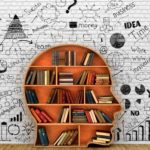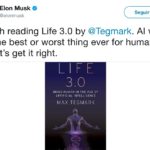A trip to artificial intelligence: six books on this scientific discipline
“Can machines think?” This is one of the questions that appear in unedited letters that were found in a warehouse at the University of Manchester. They were written by the “father” of artificial intelligence, Alan Turing.

In the letters, the mathematician from London – the author of the article “Computing Machinery and Intelligence” which was published in 'Mind' magazine in 1950 – offers his opinion on how machines are capable of emulating the human brain. He also predicts the arrival of intelligent computers.
In this text, Turing maintained that in 50 years, society would coexist with intelligent computers that would be capable of communicating through humanized interfaces, carrying out logical conclusions and learning new things.
Turing’s reflections came before the arrival of artificial intelligence in our lives. Following his manifest, thousands of scientific studies and novels have been published on the topic. Below are some of the best books to achieve a better understanding of what artificial intelligence is and what its implications are.
- Elon Musk and Bill Gates both recommend Nick Bostrom’s 'Superintelligence: Paths, Dangers, Strategies' (published by Teel) in which the author warns of the risks of artificial intelligence. The Swedish philosopher is not against new technologies. However, he maintains that it’s important to be cautious regarding these machines’ power, although without demonizing them.
- Another book recommended by Gates, the U.S. philanthropist and world’s wealthiest man, is 'The Master Algorithm' by Pedro Domingos (published by Allen Lane). It is an actual trip to artificial intelligence that explains the evolution of the algorithms and the machine learning revolution. It also gets readers to reflect on their own learning mechanisms and their perception of the world.
- With his book, 'Our final invention: Artificial intelligence and the end of the human' (published by Thomas Dunne Books), James Barrat has been sparking debate about artificial intelligence since 2013. Barrat is skeptical about the contributions of artificial intelligence and advocates for reacting before it’s too late and machines have become a threat to humankind.
- Jerry Kaplan has a much more positive take on computer science. His books 'Artificial Intelligence: What Everyone Needs to Know' (published by Teel) and 'Humans Need Not Apply: A Guide to Wealth and Work in the Age of Artificial Intelligence' (published by Teel) analyze the impact of artificial intelligence in society. He is one of the most popular voices in Silicon Valley and maintains that artificial intelligence will enable more automated countries that will make humans more free, with more creative jobs and different time management.

-The list would not be complete without mentioning the book that Elon Musk recommends on Twitter: 'Life 3.0: Being Human in the Age of Artificial Intelligence', by Massachusetts Institute of Technology (MIT) Professor Max Tegmark. “Worth Reading Life 3.0 by @Tegmark. AI will be the best or worst thing ever for humanity, so let’s get it right,” says the visionary South African, who is the driving force behind the electric car Tesla and Hyperloop, the technology that proposes using vacuum tube trains to travel at speeds of more than 1,000 km per hour.
Other of the books that Musk is passionate is ‘Lord of the flies’; something that surely interests to Anotny Peyton, Deputy Editor at @BankingTechno, whose irony at Twitter was the reason of writing this article.